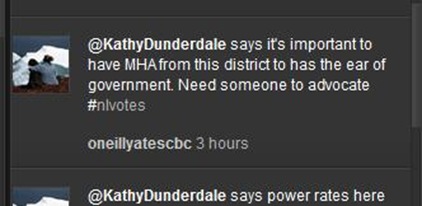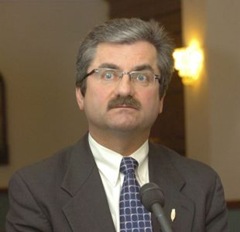Some people were surprised the other night when Danny Dumaresque told the very small audience at a Board of Trade economic forum that:
I would have to say to the mayor of this great city that there are a hell of a lot more priorities outside the overpass that need to be addressed before we start forking more money over to the City of St. John's.
Some people thought his remarks were stupid.
Danny is anything but.
What Danny Dumaresque said won’t hurt him one bit in the Isles of Notre Dame and Danny knows it.
What’s more, what Danny said is true, at least for the people who currently dominate the Liberal Party. About 12 years ago, they started shifting the party focus away from the province as a whole to one that idealises an imaginary one.
Ruralism started to bloom in the brief period Beaton Tulk served as Premier. It’s not surprising that Kevin Aylward brought Tulk back to play a key role in the current campaign.
Ruralists believe – as the Liberals’ centrepiece policy for the current campaign states – that:
The fishery is our province’s defining narrative…Our fishery has been our past and the Liberal Party believes it will be our future.
It is not just the fishery, though. Ruralism, for all its romantic, reactionary beliefs, holds the fishery as the foundation of an entire culture with social and economic components.
The Ruralists flourished after 2003 and their philosophy was firmly entrenched after 2007. Despite Kevin Aylward’s fervent efforts to pretend otherwise during the debate Wednesday night, the party he now leads has written off anything east of Goobies.
To be fair, the Liberals aren’t alone in their Ruralist beliefs. The provincial Conservatives carried on with the Liberals’ Ruralist agenda. They kept the Rural Secretariat and married its assumptions with Danny Williams’ peculiar version of nationalism.
Again, not surprisingly, Kevin Aylward proudly declared himself a staunch nationalist shortly after he took over as Liberal leader.
At its miserable heart, though, Ruralism is really nothing more than old fashioned paternalism and patronage. Grit or Tory, all the Ruralists really want to do is use public money to keep people in some parts of the province dependent on political hand-outs and therefore firmly under political control. It’s a miserable, cynical ploy.
To make it clear that patronage isn’t just a favourite ploy for one party, consider that Conservative candidate Keith Russell made it plain enough on Thursday when he said to voters in central Labrador (via the Telegram) that
we have to be on government’s side to access government coffers…
Conservative leader Kathy Dunderdale repeated basically the same line while campaigning on the south eastern coast of Labrador on Thursday. CBC’s Chris O’Neill-Yates tweeted it:

Abandoning the Avalon Peninsula doesn’t mean the Liberals are doomed as a political party. They can still win plenty of seats and could well pick up a few this time around. They’ll likely stay as the Official Opposition. What they can’t do, of course if form a government. The Liberal strategy is as short-sighted in that respect as it is simplistic.
Its narrow focus means the Ruralist Party, as it should now be named, has had way more trouble than an opposition party normally would getting candidates in the last three elections. In 2011, they’ve had to turn, once again, to dragooning political staffers to fill out the last remaining slots in the candidate roster. The only thing Beaton Tulk didn’t do in his mad search for names for the ballots on the Avalon was hold a séance.
The Ruralist Party’s focus doesn’t mean they haven’t turned up some good candidates in the process. George Joyce in St. John’s West is the best of the three candidates running in St. John’s West by a long way.
 In St. John’s Centre, newcomer Carly Bigelow has been kicking Shawn Skinner around.
In St. John’s Centre, newcomer Carly Bigelow has been kicking Shawn Skinner around.
During an appearance on Out of the Fog, she popped Skinner’s eyes a bit when she reminded him that Tory policy is to keep public service pensioners on fixed incomes with no increases and then double their electricity rates. He flipped but that pretty much sums up Skinner’s position. The truth really does hurt, as it turns out.
George and Carly could be easy choices St. John’s voters. After all, a vindictive, patronage-addled Conservative administration can hardly shag the district for funds in retribution for voting the “wrong way”. They don’t push pork into townie districts anyway, at least not like the do outside the capital city, so Sin Jawns voters have the opportunity to pick candidates on merit, rather than by party colour.
The Liberal Ruralists aren’t the only ones with problems in Capital City.
In St. John’s North, both the Conservative and New Democrat candidates are running headlong into the problems with their platforms.
An NTV profile of the district on Thursday evening’s news noted that the district has a very large percentage of people on fixed and low incomes. Plenty of public service pensioners live there so incumbent Bob Ridgley must be having a hard time explaining Tom Marshall’s cavalier dismissal of their demands for a modest increase in pension payments now that the government has $4.0 billion in cash laying about.
Add to that the Tory plan to use the cash to double electricity rates instead and you have a very tough pill to shove down voters throats. If you are a Tory that is.,
Meanwhile, Sin Jawns New Dem Dale Kirby is having an equally hard time. His party backs the Dunderdale plan to force the people of St. John’s North to pay to ship discount electricity to Nova Scotians.
And then there’s the public sector pensions.
Not a peep in the NDP platform about it at all.
Kirby must be having a devil of a time explaining how the NDP party president and his colleagues didn’t think those pensions might be an issue. Talk about treating seniors with the respect they deserve.
Pensioners can take some cold comfort with the knowledge they weren’t the only thing Kirby and his colleagues didn’t know about. They missed entirely the contracts that prevent them from introducing their new crude oil tax that was supposed to pay for some other campaign promises.
And if that wasn’t enough, there was another glaring Dipper gaffe in St. John’s.
Liberal Drew Brown is running an uphill fight in Signal Hill-Quidi Vidi against an entrenched NDP campaign that knows which way every blade of grass votes in the district. He’s another candidate who’d be far better than the incumbent.
But facing all that didn’t stop Brown from picking up on a glaring oversight in the NDP policy book: the party of supposed social responsibility has no platform plank on replacing the Dickensian-era HMP that happens to sit in Lorraine Michaels’ district:
“The existing infrastructure at Her Majesty’s Penitentiary is still abysmal, despite the findings of the 2008 ‘Decades of Darkness’ report on the state of the provincial corrections system,” Brown explained. “I find it really surprising that no one is talking about it in this election, especially considering the federal Conservatives’ forthcoming crime legislation is likely going to result in an increased number of prisoners going through the system.”
The Liberals plan to begin work on replacing the prison – and aggressively lobbying the federal government to cost-share the project – within weeks of forming the government.
“Without safe and effective prisons, our system of justice here in Newfoundland and Labrador is seriously weakened. Better conditions for the prisoners aside, the facility workers themselves deserve a safer workplace than the one they currently have,” Brown added. “It’s a government facility – the working conditions for employees at Her Majesty’s Penitentiary should be held to the same standard as any other government institution.”
Wowsers.
So at about the half-way point in the general election, one party - the Liberals – have voluntarily surrendered a huge chunk of the voting population to the other parties. They’ve left some very good candidates to fend for themselves.
Another party has just missed the boat entirely on core issues in the one region of the province where they are supposed to have such amazing support and affinity.
this is not a townie versus bayman thing, as much as some people might like to paint it that way.
It’s really about political parties that operate with limited political vision.
- srbp -


 In St. John’s Centre, newcomer Carly Bigelow has been kicking Shawn Skinner around.
In St. John’s Centre, newcomer Carly Bigelow has been kicking Shawn Skinner around.